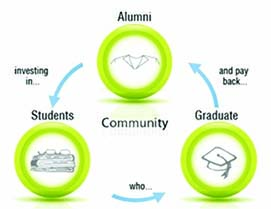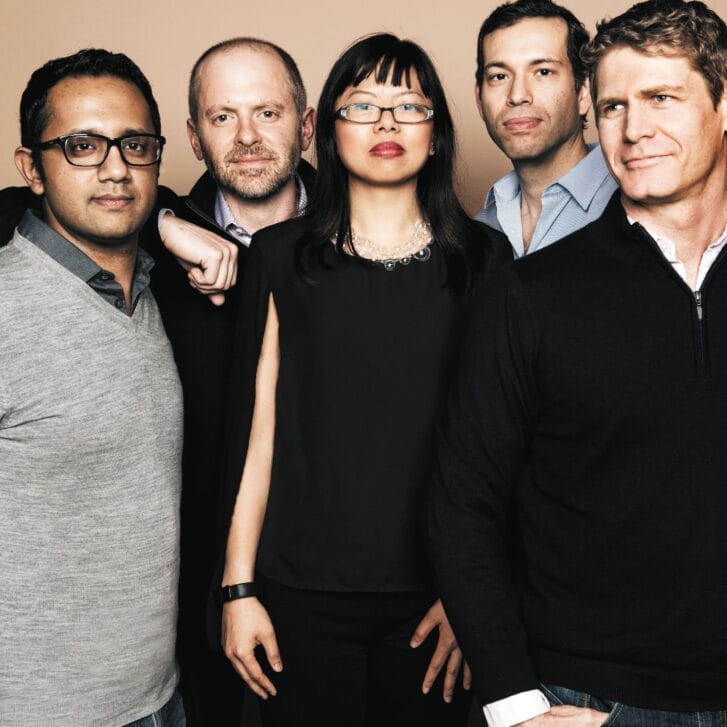Startup fever has infiltrated the Wharton campus, where the founders of fledgling young companies meld their passion and education with well-intended purpose and potential profits. They share ambitious goals aimed at filling needs, solving problems and in many cases doing good. We look at six up-and-comers here. From improving the safety of highways in India to lowering the cost of graduate school loans, the ideas spawned by these students portend the future of business in this technological age.
Company: CommonBond
Founders: David Klein; Michael Taormina; and Jessup Shean, WG’12, L’12
When CommonBond co-founder David Klein arrived at Wharton, he found financing his degree unnecessarily expensive. The fixed federal rate was a 7.7 percent blended average. At the same time, investors were finding it difficult to get yield anywhere. Having worked for American Express, Klein understood credit spreads and wondered why student loans could not be offered at lower rates. After some investigation, Klein realized that the federal loan system assigned the same risk to all students, a major mispricing of risk.
Then he met now-second-year MBA Michael Taormina at a Wharton Entrepreneurship event and Jessup Shean, WG’12, L’12, through a mutual friend, and the team came together to create CommonBond (originally called FundMyMBA.com) in November 2011, in part based on work Klein did in Professor Ethan Mollick’s Introduction to Entrepreneurship course. (Klein deferred his second year to pursue CommonBond.)

© CommonBond/Elizabeth French 2012
The concept is simple. CommonBond connects student borrowers with alumni investors. Students gain access to low-cost fixed-rate loans; CommonBond’s interest rate is fixed at 6.24 percent. Alumni build social wealth and make a competitive financial return (>4 percent) on a sound investment. Fewer than 1 percent of Wharton students default on loans, Klein notes, while the national average is above 9 percent.
“If Facebook and LinkedIn had a baby with Sallie Mae, it would be CommonBond,” says Klein, who believes the appeal of his firm is as much about the strong community cultivated among student and alumni members. One of CommonBond’s other distinctions is its strong social mission. For every graduate degree fully funded, the company pays for a year’s education of a student in need abroad. CommonBond is the first company to bring this “one-to-one” model, made famous by TOMS Shoes and Wharton’s own Warby Parker, to education. It also promises to help fund financial literacy education in low-income neighborhoods and plans a pilot program at KIPP Charter Schools in West Philadelphia.
The company has raised $3.5 million from investors—$2.5 million from Wharton alumni for the student loan pool. An additional $1 million in seed funding has come from a “super angel.” Loans to Wharton MBAs began in November 2012. CommonBond plans national expansion in 2013.
Company: CarHound
Founder: Andrew Liu, WG’12
CarHound is an online car-buying service that functions differently from the many existing online car-buying business models, such as Cars.com and AutoTrader.com, which founder Andrew Liu, WG’12, describes as primarily lead generation services. Such outfits connect buyers with sellers, but they don’t negotiate the deals for the customers.

“Lead generation is not a sustainable business model in the automotive sector,” argues Liu.
Not unlike human car brokers, CarHound.com finds the exact car with colors and options that the customer wants, negotiates the price and sets up an appointment for the customer at the dealership—but at a fraction of the cost of a traditional broker. “At the end of the day, all the customer has to do is sign the paperwork and pick up the keys at the dealership,” says Liu.
CarHound works closely with Internet and fleet managers at 250 dealerships to find the appropriate cars and to negotiate within the price ranges of its customers, Liu says.
The company, which was launched in May 2011, has raised $150,000, mostly from Liu’s classmates. The Pasadena, CA-based company employs three people, but Liu plans to grow that number to 10 in 2013 as it expands into markets beyond Southern California. CarHound also hopes to increase the number of cars it sells beyond the current two or three cars a day on its quest to attract new dealers and investors. They have just reached an agreement with a major partner to scale their dealer network nationally with close to 3,000 dealers across the U.S.
Says Liu: “We are trying to make car buying a concierge service that is affordable for all.”
Company: PoverUP
Co-founders: Charlie and Elie Javice
PoverUP, which is short for “poverty is up,” is a social community aimed at trying to end the pain of poverty through strategic microfinancing. It is similar to Kiva, the pioneering nonprofit that allows people to lend money online to aspiring entrepreneurs in developing countries.

“We are building the brand around trying to do good,” says co-founder and senior Charlie Javice, a sophomore working toward a dual Wharton-engineering degree.
The company’s targeted areas of investment are education, low-income housing, health care, clean energy and socially responsible financial services.
The company conducted a soft launch last November, though it gained national attention in FastCompany, CNBC and Forbes.com. PoverUP has raised $300,000 in friends-and-family seed money but is already turning down venture backers who are “knocking down the door,” Charlie Javice says.
Revenues will be driven by three sources: administration fees for investments, job listings and premium memberships. The company doesn’t intend to charge a fee to connect lenders to borrowers. Investment administration fees will help cover the online transaction and maintenance costs of the website.
The company has not yet facilitated any loans but is in final discussions with agencies that focus on its target areas of investment. Potential opportunities include tackling early-childhood nutrition and helping to launch nutrition yogurts to expanding solar lanterns in rural villages in Africa.
What’s more, PoverUP has plans for a speakers’ board, which will bring premium members together to discuss topics relative to the company’s modus operandi. The firm is also mulling an online job recruitment service that could generate revenue.
Says Javice: “We’re interested in creating a holistic community.”
Company: Prajwalbharat
Founder: Anuj Kulkarni
“Prajwalbharat” means “Lightup India.” In practice, it means being devoted to improving the quality of life for citizens of India by making its roads safer through better street lighting. “We felt when we launched in grassroots of India that we needed an indigenous feel,” says founder Anuj Kulkarni of his native country. Hence, an indigenous name. But why the focus?
“Street lighting in India is strongly correlated with safety,” he adds. More than 90 percent of the car accidents that occur at night are fatal in the sub-continent, largely due to poorly lit roads and streets.
With increasing energy costs (4,400 megawatts of national public lighting load) and exploding cities, the government does not have enough fund outlay to maintain the lighting infrastructure, Kulkarni explains. Consequently, the market lacks companies offering reliable street-lighting services.
So Kulkarni put his Wharton degree on hold last year, returned to India and launched a company to tackle this problem. His solution? Kulkarni uses small billboard-like advertising attached to light posts, called “litupps,” as his revenue source. Radio stations, mobile service providers, NGOs and the government itself are among his biggest advertisers. Built into his business model are funds for upkeep and training so workers know how to install and maintain the lights. With the operational expenses saved, the government can reinvest this money in technologies such as LEDs, further reducing energy costs, according to Kulkarni.
“It’s media taking a step to remove darkness,” he says.
Going a step beyond free maintenance for lights, Kulkarni is also offering free installation of new lights. To do this, he has taken help from large companies (of greater than $200 million) that are mandated to spend a percentage of their profits on social responsibility activities (street lighting being one of them).
Kulkarni is bootstrapping his startup using friends and family investors thus far. The company has already installed 200 high-quality LED street lamps in southern Maharashtra. That is double the amount in his original business plan. His ambitious goals for 2013 are to raise a few million dollars and install as many as 10,000 streetlights.
Says Kulkarni: “Poor service delivery in India is a plague. We need curative and sustainable business models to change this. Prajwalbharat is the answer.”
Company: Baby.com.br
Founder: Davis Smith, WG’11, G’11

When a fellow Wharton student groused about the high cost of diapers and strollers in his native country of Brazil, Davis Smith, WG’11, G’11, had an epiphany: Why not launch an online baby store in Brazil that offers lower prices and more variety and delivers directly to the home? And that’s how the idea for Baby.com.br was born in the summer of 2010.
It takes a classic approach to electronic commerce, focusing on a targeted vertical category. The difference is its strategic advantage: It focuses solely on a local market (Brazil, with a high focus on urban centers like São Paulo and Rio de Janeiro) and solves problems specific to urban Brazil, such as high prices, selection and timely distribution, Smith says.
It isn’t uncommon to see flights from São Paulo to Miami packed with young Brazilian couples destined for Florida malls to stock up on baby gear because prices are lower, even when accounting for the airfare. More importantly, selection and inventory are greater, Smith says.
The 34-year-old Brigham Young University graduate is no stranger to South America, where he was a missionary for the Mormon church in Bolivia. Or e-commerce. Smith and his cousin bootstrapped an online retailer specializing in the billiards vertical, called PoolTables.com, which they sold for an undisclosed amount.
Due to the distribution cost structure of Brazil (retailers source most goods from distributors instead of directly from manufacturers) and payroll taxes as high as 70 percent, Baby.com.br can only compete at prices as low or slightly lower than its most efficient brick-and-mortar competitors. Its biggest differentiators are inventory and delivery. São Paulo has arguably the worst traffic congestion in the world, where many middle-class shoppers ride buses that can take up to two hours to travel five miles. Plus, Smith quips, have you ever tried to carry a crib onto a bus? Baby.com.br’s network of trucks can deliver directly from its warehouse to customers’ homes. The firm employs more than 200 people and has more than a million Facebook fans. It has raised about $22.6 million in two venture capital rounds at the time of this writing.
“The growth has been unbelievable,” Smith says. “It’s been a blast, a real wild ride.”
Smith hopes to continue his company’s incredible growth rate by expanding into new vertical categories serving female customers, without expanding the company’s geographical footprint, where they already communicate with more than 2 million moms on a daily basis.
Says Smith: “It really is a no-brainer.”
Company: Curalate
Founder: Apu Gupta, WG’05

When it comes to making transactions on the Web, it turns out that image is everything.
Before going public last year, Facebook shelled out a whopping $1.2 billion for Instagram, then a tiny startup employing less than 20 people. Why? Because pictures are worth a thousand webpage hits. Picture-sharing was responsible for Facebook’s explosive growth, and the social networking giant needed to protect its perch at the top.
Most media analytics tools are dependent on words, but the dollar amounts in the online shopping carts of consumers who use image-centric website Pinterest are twice the size of those on Facebook, Apu Gupta, WG’05, points out. So Gupta, 37, set out to create a marketing tool based on images. He lured co-founder Nick Shiftan, a Microsoft software engineer and Harvard graduate, from Seattle to Philadelphia to help launch Curalate in mid-2011 with $750,000 in seed capital. Current investors include firms with Penn ties: New Enterprise Associates, MentorTech Ventures and First Round Capital.
“Nearly 70 percent of all Web-branding involves an image, which means most brands now depend on images, not words, for triggering transactions on the Internet,” says Gupta.
Curalate’s cloud-based tool can identify which images—say, a brand-name wool sweater in blue—drive Internet traffic and sales more than others.
Now Curalate is evolving from being just a software platform to becoming a provider of a full suite of brand marketing software for the visual Web. Users can identify who clicked on the picture of that blue sweater and target them with more efficient marketing campaigns.
It counts 600 brands, including Kraft and Neiman-Marcus, and advertising agencies as customers, and was named a top 50 new American company by Business Insider. Now employing 14 people, the startup aims to finish the transition from analytics tools to full-fledged software-as-a-service outfit in 2013.
Dorm-Room Resources
Talk with most any entrepreneur who earned a degree at Wharton, and they are likely to credit their School experiences for success in launching one (or several) businesses. They might have taken entrepreneurship classes through the Goergen Entrepreneurial Management Program, or gained financial assistance through the Wharton Innovation Fund.
Chances are, they have taken advantage of the many resources available through Wharton Entrepreneurship. As part of the Management Department, the program has made a name for itself with regular campus events (such as those that facilitate meetings and mentorship between alumni and students) and concrete assistance to budding startups such as office space, funding and constructive feedback. One of its most anticipated events is the annual Wharton Business Plan Competition.
More resources exist across Penn’s campus, such as the Center for Technology Transfer, the Entrepreneurship Legal Clinic at Penn Law, the Penn Founders’ Club and Weiss Tech House.
Editor’s note: See more of the latest and greatest alumni and student startups in this issue’s Watch List. And check out which entrepreneurs (Warby Parker and more) came across our radar last year in “Making Waves on Their Own Ship.”


























